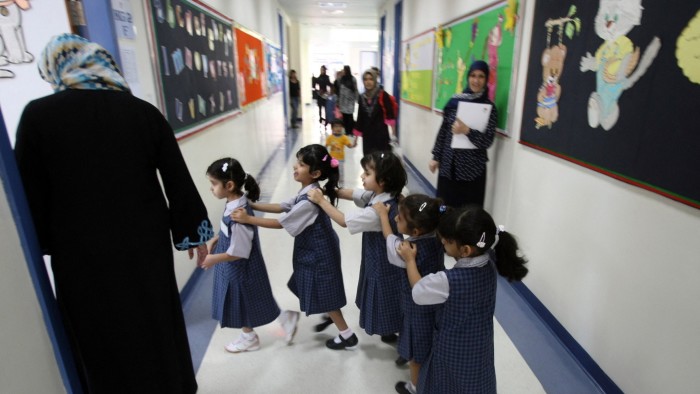Unlock the Editor’s Digest for free
Roula Khalaf, Editor of the FT, selects her favourite stories in this weekly newsletter.
The United Arab Emirates is rolling out an artificial intelligence curriculum from the earliest years in state schools as it seeks to become a regional AI hub and avoid the past “mistake” of not reacting to the spread of social media, its education minister said.
While many countries have introduced lessons about AI in schools, the Gulf country is investing heavily to position itself as an AI hotspot and the scheme partly aims to prepare students for the future workplace.
But “the trigger [for the AI curriculum] was how much we saw students impacted by social media, and how we did not adapt to that,” education minister Sarah al-Amiri told the Financial Times, referring to the struggle of dealing with the attention sapping power of platforms such as TikTok and Instagram. “We did not want that mistake to happen again.”
Although the wealthy UAE enjoys high living standards, a 2022 study showed UAE students perform worse than the OECD average in maths, reading and science, as well as the problem-solving and critical thinking skills needed to prepare young people for a changing workplace.
Some 300,000 children attend state schools, which are free for Emiratis and other Gulf Cooperation Council nationals. But fee-paying private schools are also popular, and a fast-growing business.
Hoping to diversify its oil-dependent economy, Abu Dhabi has bet heavily on AI, from national champion G42 striking deals with Microsoft and chipmaker Cerebras, to its investment vehicle MGX backing a $30bn AI infrastructure fund. And as well as integrating AI into education, it has also outlined plans to use AI in lawmaking.
The former chair of the UAE’s space agency and minister of state for public education and future technology, Amiri was appointed education minister this year as part of a wider shake-up of the schooling system.
Asked if students’ underperformance would make applying an AI curriculum difficult, Amiri said that her “team has been focusing on improving learning outcomes through transformational initiatives precisely because we recognise these challenges, but they are not a reason to postpone the introduction of a curriculum focused on emerging systems”.
A “future-facing curriculum” should be used to improve performance levels, Amiri argued, adding that the ministry was also overhauling maths teaching.
Although AI programming was initially going to be for high schoolers, the rapid evolution of the technology pushed the education ministry to expand the age range to include pupils at nursery schools.
“We realised that in everyone’s daily life, including children as young as four years old, they are exposed to it in one way or another,” she said, citing devices such as Amazon’s voice activated assistant Alexa.
Teaching children to think critically about the output of AI chatbots like ChatGPT will be central to the new AI curriculum, Amiri said. The student “needs to be aware that there is bias, which means that when I get a result, do not take it blindly”, she said.
Ethical use of AI will also be a component of the curriculum, which is capped at 20 hours per academic year. The children will also learn how to write prompts, the directions given to a chatbot to elicit everything from text-based information to images, and how to use AI for research purposes without plagiarising.
Countries from China to Finland are integrating AI into their education systems. Singapore, for example, is using AI to customise learning and give feedback via an online portal.
